Abstract
Because the incidence of both neonatal respiratory distress syndrome and neonatal mortality can be reduced by giving corticosteroids to women expected to deliver preterm and by giving surfactant to babies at high risk of developing hyaline membrane disease, we have considered what effects the adoption of one or both of these preventive policies would have on the costs of neonatal care. We have estimated the effects of treatment from overviews of the relevant controlled trials, and estimated costs from observations of care at one neonatal unit. Our results suggest that if either of these policies is adopted for all babies under 35 weeks' gestation at a drug cost of 150 pounds or less/baby, the overall costs of care would be reduced by between 1 and 10%. The cost per survivor would be reduced by up to 16% even if the drug cost were to be as high as pounds 550/baby. If the policies were to be adopted only for babies under 31 weeks' gestation, both policies would result in a reduction in cost of between 5 and 16%/survivor, although the increased survival resulting from the policies would lead to an increase in overall costs for babies of less then 31 weeks' gestation of between 7 and 32%.
Full text
PDF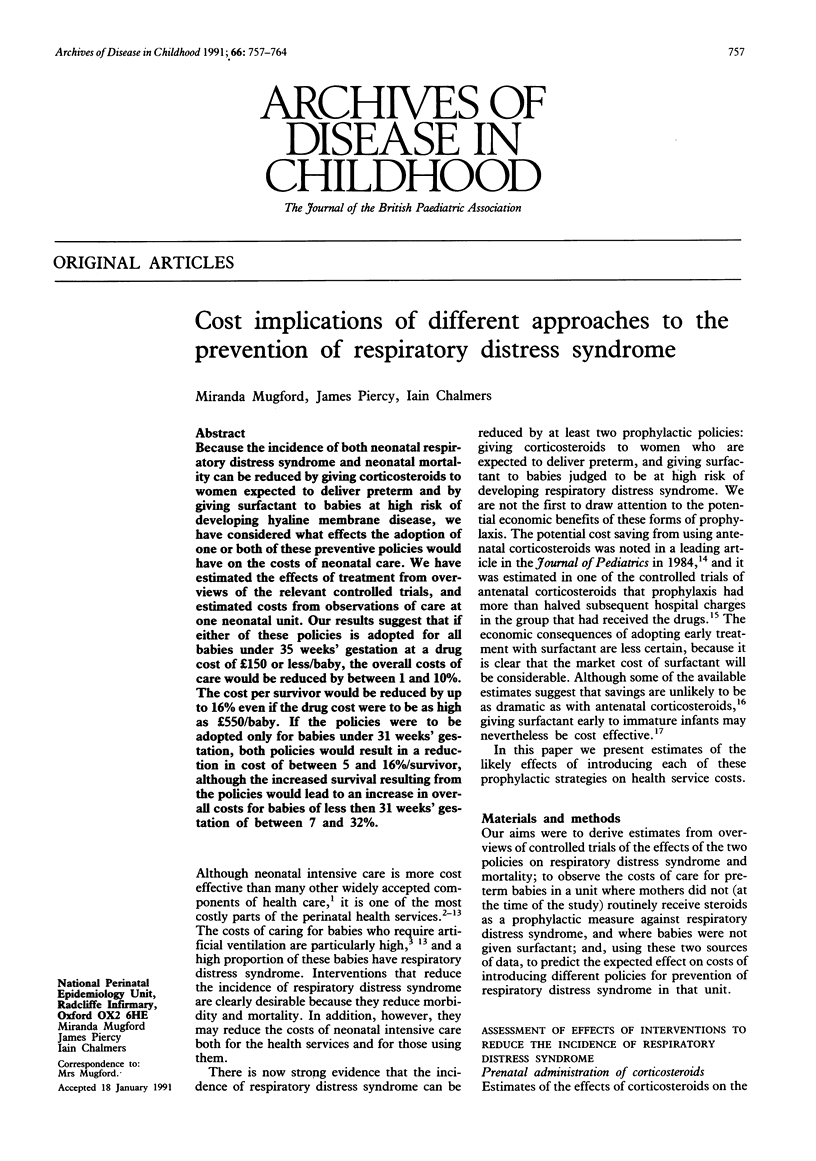

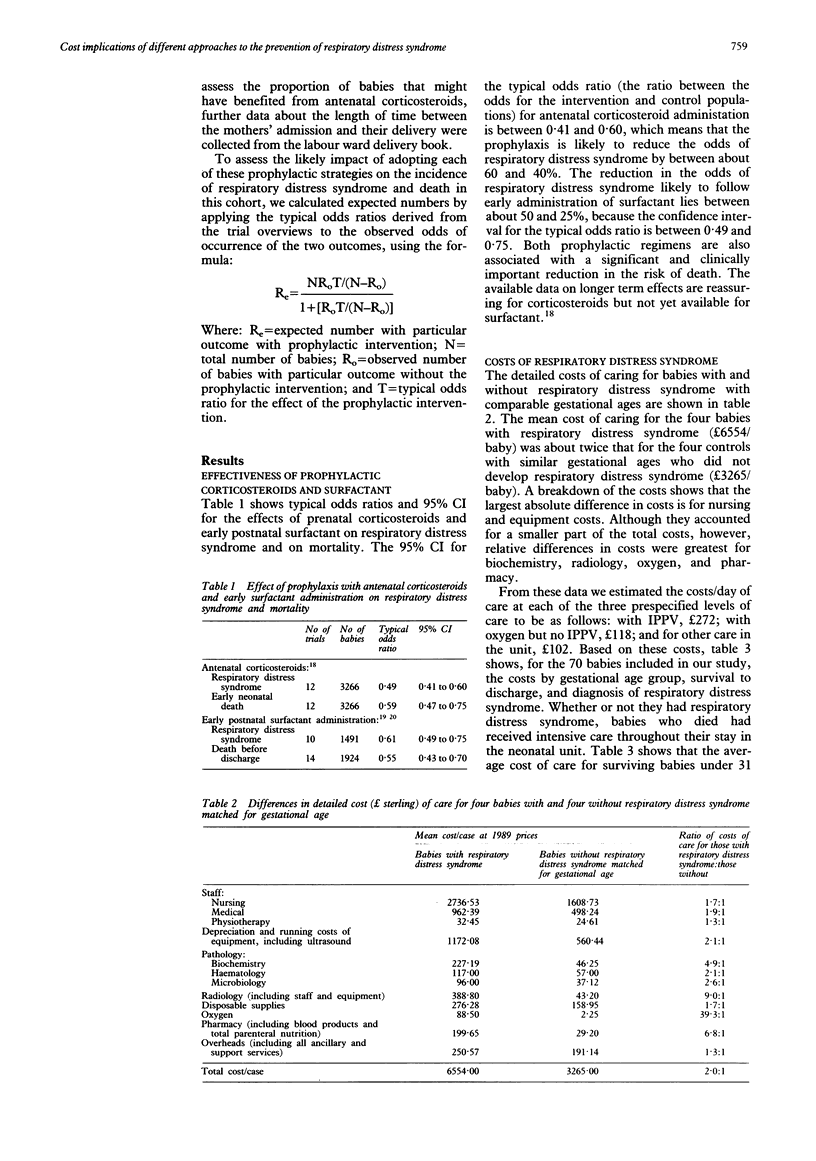
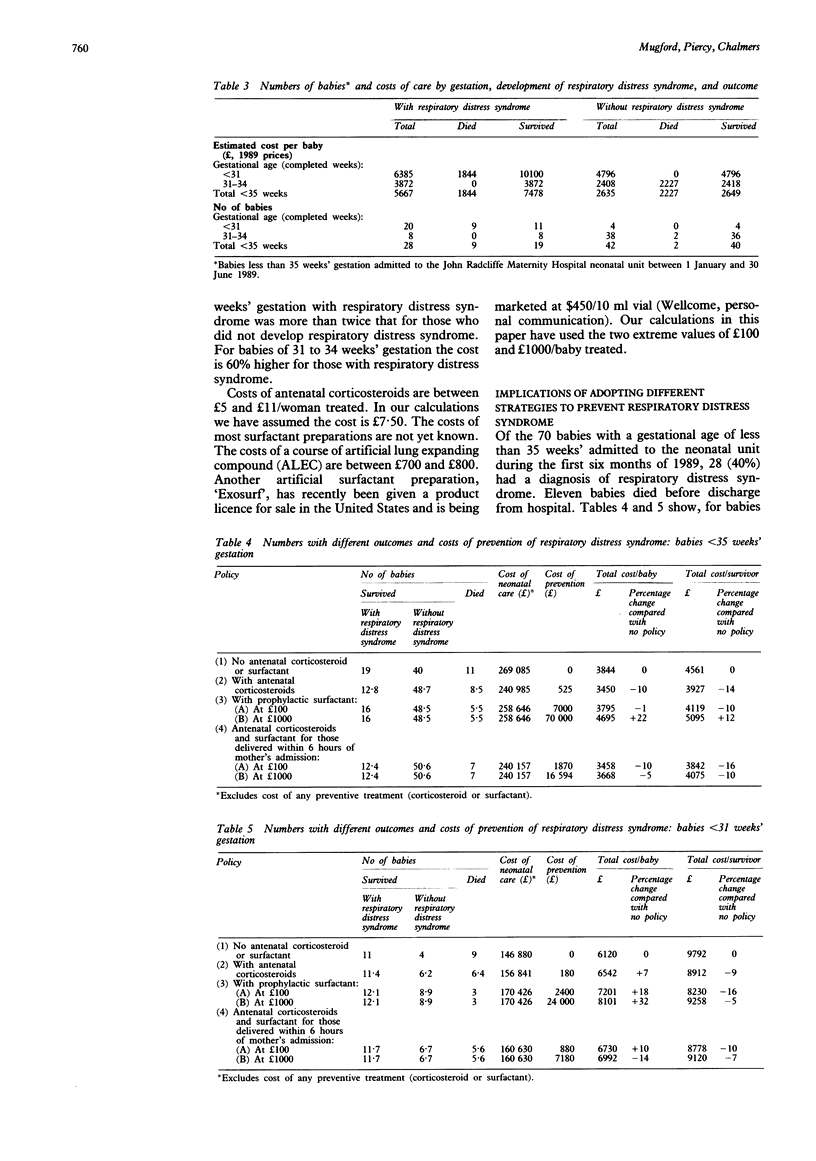
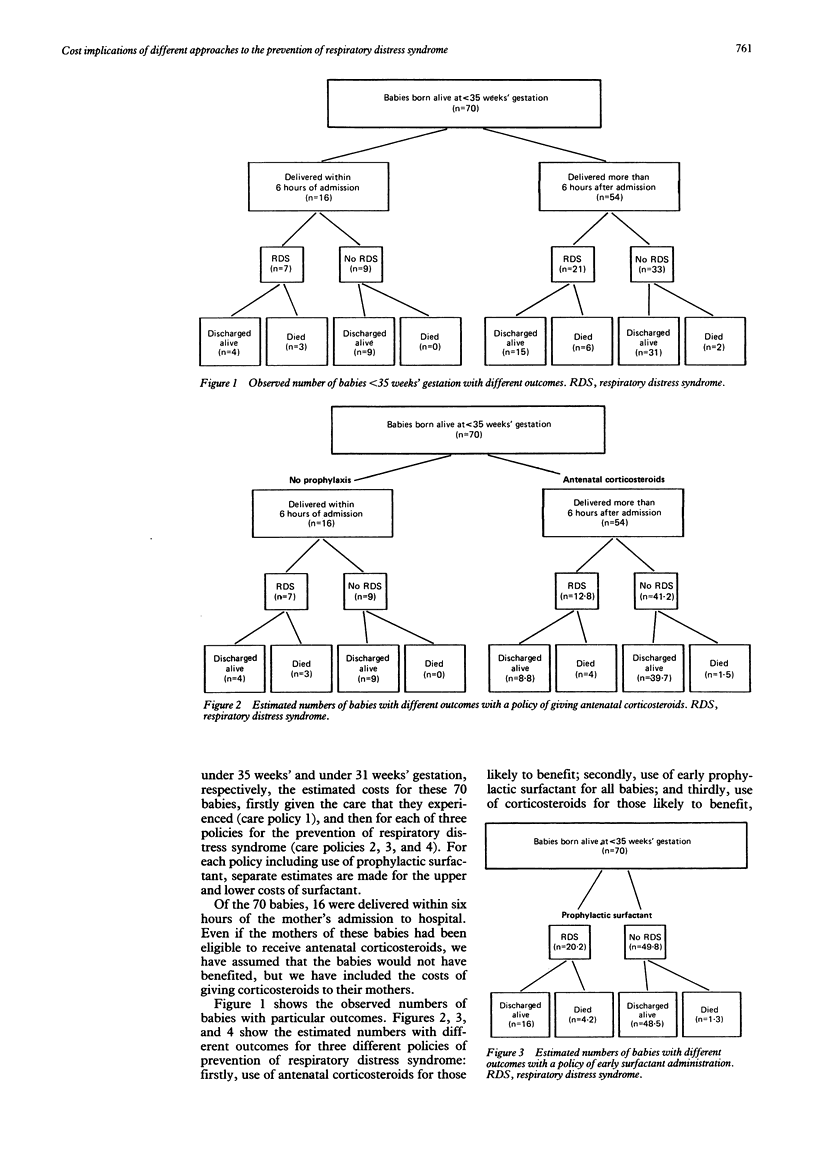
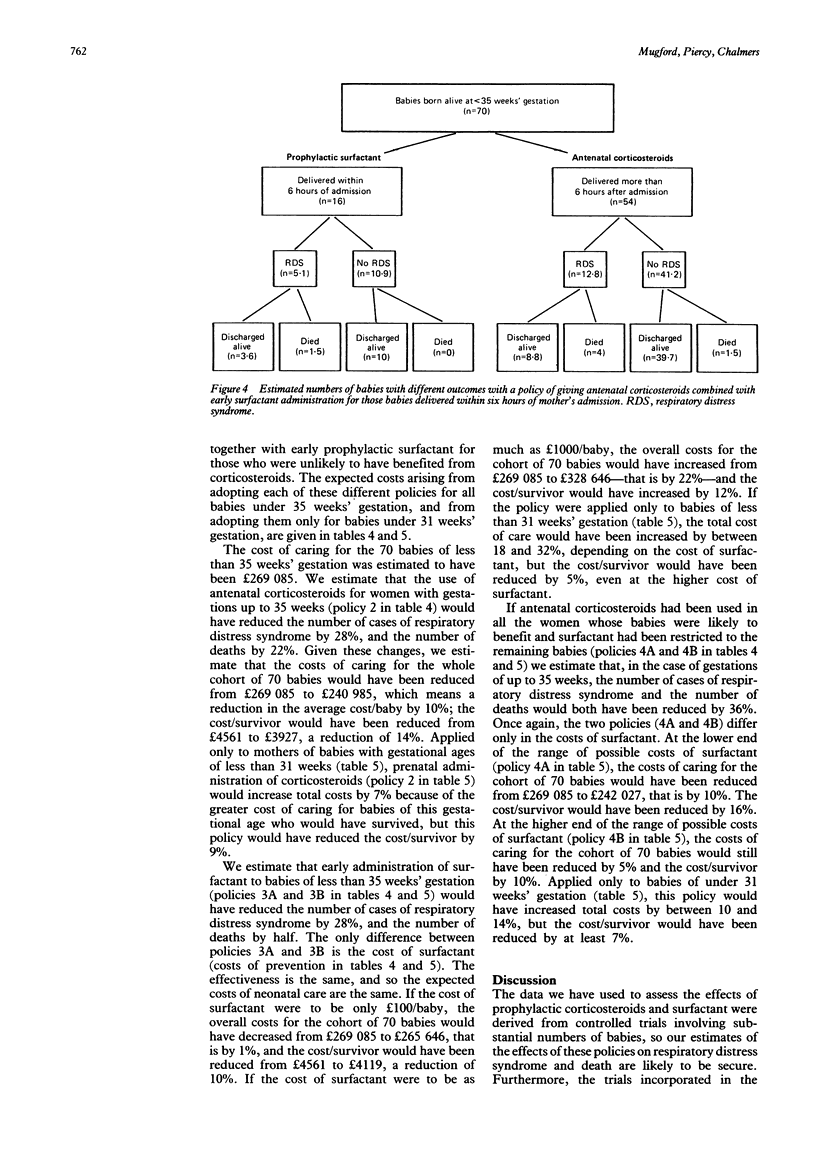

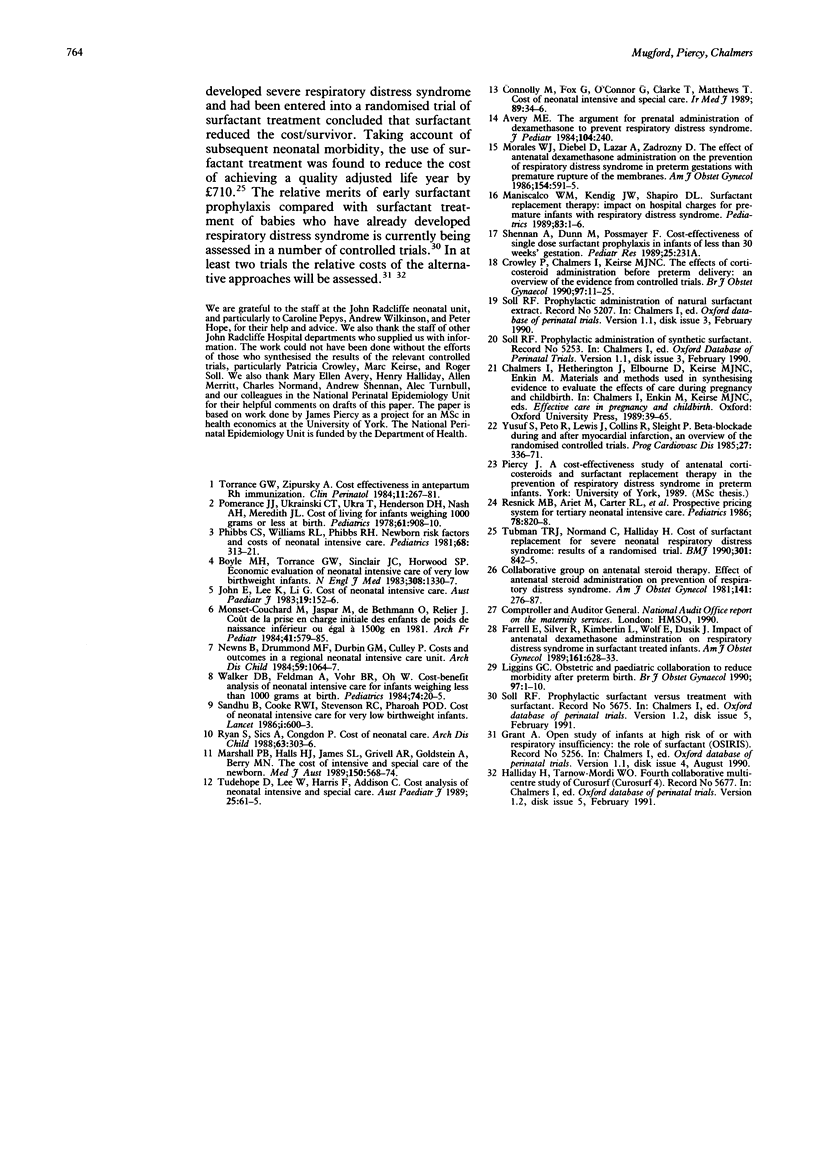
Selected References
These references are in PubMed. This may not be the complete list of references from this article.
- Avery M. E. The argument for prenatal administration of dexamethasone to prevent respiratory distress syndrome. J Pediatr. 1984 Feb;104(2):240–240. doi: 10.1016/s0022-3476(84)81000-8. [DOI] [PubMed] [Google Scholar]
- Boyle M. H., Torrance G. W., Sinclair J. C., Horwood S. P. Economic evaluation of neonatal intensive care of very-low-birth-weight infants. N Engl J Med. 1983 Jun 2;308(22):1330–1337. doi: 10.1056/NEJM198306023082206. [DOI] [PubMed] [Google Scholar]
- Crowley P., Chalmers I., Keirse M. J. The effects of corticosteroid administration before preterm delivery: an overview of the evidence from controlled trials. Br J Obstet Gynaecol. 1990 Jan;97(1):11–25. doi: 10.1111/j.1471-0528.1990.tb01711.x. [DOI] [PubMed] [Google Scholar]
- Farrell E. E., Silver R. K., Kimberlin L. V., Wolf E. S., Dusik J. M. Impact of antenatal dexamethasone administration on respiratory distress syndrome in surfactant-treated infants. Am J Obstet Gynecol. 1989 Sep;161(3):628–633. doi: 10.1016/0002-9378(89)90367-0. [DOI] [PubMed] [Google Scholar]
- John E., Lee K., Li G. M. Cost of neonatal intensive care. Aust Paediatr J. 1983 Sep;19(3):152–156. doi: 10.1111/j.1440-1754.1983.tb02081.x. [DOI] [PubMed] [Google Scholar]
- Maniscalco W. M., Kendig J. W., Shapiro D. L. Surfactant replacement therapy: impact on hospital charges for premature infants with respiratory distress syndrome. Pediatrics. 1989 Jan;83(1):1–6. [PubMed] [Google Scholar]
- Marshall P. B., Halls H. J., James S. L., Grivell A. R., Goldstein A., Berry M. N. The cost of intensive and special care of the newborn. Med J Aust. 1989 May 15;150(10):568-9, 572-4. doi: 10.5694/j.1326-5377.1989.tb136694.x. [DOI] [PubMed] [Google Scholar]
- Monset-Couchard M., Jaspar M. L., de Bethmann O., Relier J. P. Coût de la prise en charge initiale des enfants de poids de naissance inférieur ou égal à 1 500 g en 1981. Arch Fr Pediatr. 1984 Oct;41(8):579–585. [PubMed] [Google Scholar]
- Morales W. J., Diebel N. D., Lazar A. J., Zadrozny D. The effect of antenatal dexamethasone administration on the prevention of respiratory distress syndrome in preterm gestations with premature rupture of membranes. Am J Obstet Gynecol. 1986 Mar;154(3):591–595. doi: 10.1016/0002-9378(86)90607-1. [DOI] [PubMed] [Google Scholar]
- Newns B., Drummond M. F., Durbin G. M., Culley P. Costs and outcomes in a regional neonatal intensive care unit. Arch Dis Child. 1984 Nov;59(11):1064–1067. doi: 10.1136/adc.59.11.1064. [DOI] [PMC free article] [PubMed] [Google Scholar]
- Phibbs C. S., Williams R. L., Phibbs R. H. Newborn risk factors and costs of neonatal intensive care. Pediatrics. 1981 Sep;68(3):313–321. [PubMed] [Google Scholar]
- Pomerance J. J., Ukrainski C. T., Ukra T., Henderson D. H., Nash A. H., Meredith J. L. Cost of living for infants weighing 1,000 grams or less at birth. Pediatrics. 1978 Jun;61(6):908–910. [PubMed] [Google Scholar]
- Resnick M. B., Ariet M., Carter R. L., Fletcher J. W., Evans J. H., Furlough R. R., Ausbon W. W., Curran J. S. Prospective pricing system for tertiary neonatal intensive care. Pediatrics. 1986 Nov;78(5):820–828. [PubMed] [Google Scholar]
- Ryan S., Sics A., Congdon P. Cost of neonatal care. Arch Dis Child. 1988 Mar;63(3):303–306. doi: 10.1136/adc.63.3.303. [DOI] [PMC free article] [PubMed] [Google Scholar]
- Sandhu B., Stevenson R. C., Cooke R. W., Pharoah P. O. Cost of neonatal intensive care for very-low-birthweight infants. Lancet. 1986 Mar 15;1(8481):600–603. doi: 10.1016/s0140-6736(86)92820-5. [DOI] [PubMed] [Google Scholar]
- Torrance G. W., Zipursky A. Cost-effectiveness of antepartum prevention of Rh immunization. Clin Perinatol. 1984 Jun;11(2):267–281. [PubMed] [Google Scholar]
- Tubman T. R., Halliday H. L., Normand C. Cost of surfactant replacement treatment for severe neonatal respiratory distress syndrome: a randomised controlled trial. BMJ. 1990 Oct 13;301(6756):842–845. doi: 10.1136/bmj.301.6756.842. [DOI] [PMC free article] [PubMed] [Google Scholar]
- Tudehope D. I., Lee W., Harris F., Addison C. Cost-analysis of neonatal intensive and special care. Aust Paediatr J. 1989 Apr;25(3):61–65. [PubMed] [Google Scholar]
- Walker D. J., Feldman A., Vohr B. R., Oh W. Cost-benefit analysis of neonatal intensive care for infants weighing less than 1,000 grams at birth. Pediatrics. 1984 Jul;74(1):20–25. [PubMed] [Google Scholar]


